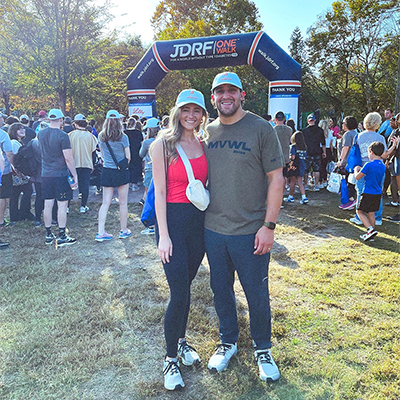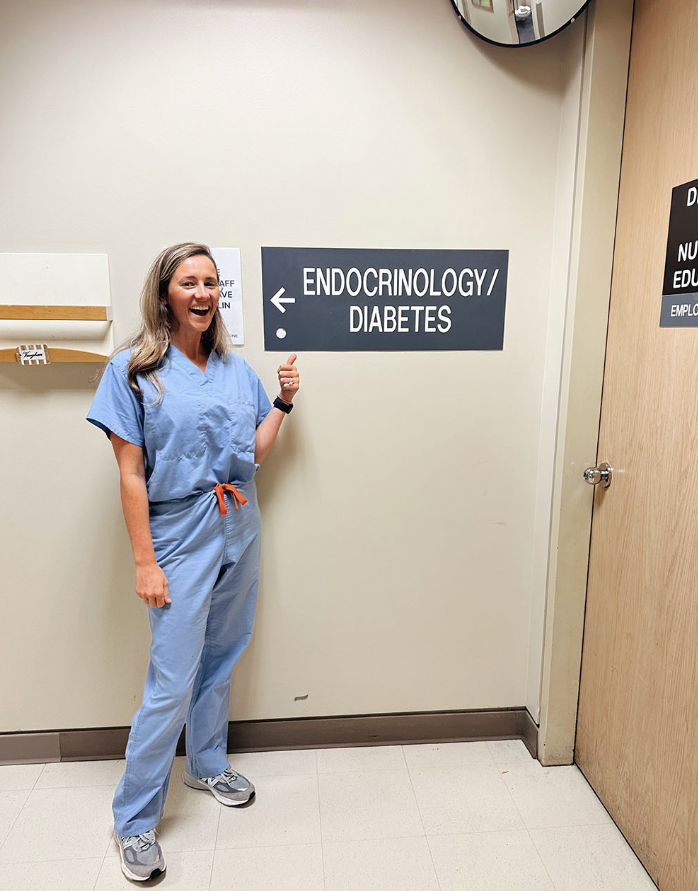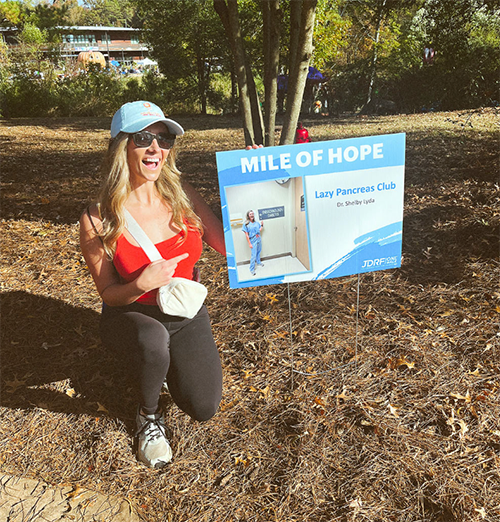 From January to May of 2023, Shelby Lyda, M.D., was extremely tired and had brain fog, but she chalked it up to the demands of a residency program.
From January to May of 2023, Shelby Lyda, M.D., was extremely tired and had brain fog, but she chalked it up to the demands of a residency program.
Lyda was within the UAB Department of Surgery Residency Program at the time, completing her research year. She thought the fatigue and brain fog had to do with the stresses of her work.
After completing medical school at UAB in 2019, Lyda was matched with the UAB General Surgery Residency Program. She completed two years of clinical residency and was also a Birmingham VA Health Care System Quality Scholar for two years.
Fast forward to fall 2022, and Lyda was in the midst of completing her first research year. Though Lyda had a good experience with the surgery residency program, she began to come to the realization that she would rather pursue anesthesiology as a career path.
Lyda was not disheartened by the time commitment required to change specialties. Though she had given almost five years of training to the surgery residency and an anesthesiology residency is another four years, Lyda knew it would be worth it for her.
“For me, it was completely worth it to know that I would spend the rest of my career doing what I love,” said Lyda. “I think we can be completely paralyzed by fear, but if you want to make a career change, it’s never too late.”
So Lyda began the match process again, re-applying alongside a majority of fourth-year medical students to anesthesiology residencies and eventually matching with the UAB Department of Anesthesiology and Perioperative Medicine Residency Program in March 2023.
 During spring of 2023—in addition to feeling tired and experiencing brain fog—Lyda also noticed she had lost 25 pounds. She had not changed her diet or started working out more, but alarm bells were not yet ringing for her as she was going through a major life change.
During spring of 2023—in addition to feeling tired and experiencing brain fog—Lyda also noticed she had lost 25 pounds. She had not changed her diet or started working out more, but alarm bells were not yet ringing for her as she was going through a major life change.
Plus, Lyda and her husband were beginning the process of IVF with Sukhkamal Campbell, M.D., assistant professor in the UAB Department of Obstetrics and Gynecology and director of Fertility Preservation Services. Lyda says she and her husband sadly experienced two miscarriages before beginning IVF.
“When I had my first miscarriage, I had a ton of lab work done at UAB with Dr. Sukhamal Campell,” said Lyda. “We went through a full panel in March. At that time, my hemoglobin A1C came back as seven, and we both assumed it was a lab error.”
According to the Centers for Disease Control and Prevention, a normal A1C level is below 5.7%, and an A1C higher than 6.5% is considered diabetic. An A1C level gives doctors and patients an idea of average blood sugar levels over the last three months.
In June, Campbell ran labs again for Lyda. Her A1C results came back at 13, and she also had four antibodies for Type 1 diabetes. Lyda still remembers the phone call to this day.
“Dr. Campbell called me on June 13 at 5 p.m. as soon as my labs came in to let me know the news that I had been diagnosed with Type 1 diabetes,” said Lyda. “I was so filled with fear at the thought of having to manage diabetes daily and was afraid to work out again, but now I don’t think twice about it anymore.”
For Lyda, the diagnosis began to make sense of many of her symptoms. From brain fog to using the restroom many times a night to being incredibly tired. She had even passed out at a football tailgate the previous fall.
“After being on insulin for just 24 hours, I realized that I had not felt that good in over a year,” said Lyda. “It was almost an immediate change, and I can’t believe I spent so much time feeling as bad as I did. I couldn’t even fold laundry without feeling like I needed a nap.”
Since her diagnosis, Lyda has established a closed-loop system for managing her diabetes, where her continuous glucose monitor can “talk” to her insulin pump and let it know how much insulin to deliver throughout each day.
Lyda says she has more compassion for her patients than ever—especially in dealing with insurance as a person with diabetes—and she encourages everyone to explore their symptoms.
 “Type 1 diabetes used to be known as Juvenile Diabetes, but my diagnosis at 30 years old is a wonderful reminder to everyone to get regular check-ups and blood work done with your primary care doctor or specialist. Within the diabetes community, we even see those who are 60, 70, and 80 years old getting diagnosed with Type 1 diabetes.”
“Type 1 diabetes used to be known as Juvenile Diabetes, but my diagnosis at 30 years old is a wonderful reminder to everyone to get regular check-ups and blood work done with your primary care doctor or specialist. Within the diabetes community, we even see those who are 60, 70, and 80 years old getting diagnosed with Type 1 diabetes.”
Lyda has found community in those with diabetes. She says her favorite resources are the Juicebox Podcast and Facebook group. She feels as though she has learned more about managing diabetes through these two resources than anywhere else.
November was Lyda’s first Diabetes Awareness Month, and she took it head on, supporting and participating in the JDRF walk. In fact, her team raised almost $2,000 and came in 11th place overall.
“I am so lucky to have an amazing support system in my family and friends. This month, I’ve enjoyed sharing my own story and educating others around me,” said Lyda. “Type 1 diabetes is often misunderstood. People may think that it is caused by eating too much sugar, but it is actually an immune disease. I just encourage everyone to be mindful and raise awareness.”